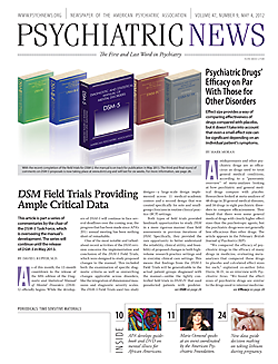People in recovery from mental illness are the educators in one innovative psychiatry department that is winning awards as it strives to ensure that mental health recovery principles are fully integrated into the academic curriculum.
The Georgia Recovery-Based Educational Approach to Treatment (Project GREAT), located in the Georgia Health Sciences University (GHSU) Department of Psychiatry and Health Behavior, uses certified peer specialists to educate psychiatry and psychology faculty, psychiatry residents, and medical students about the importance of empowering their patients and encouraging them to play an active role in their own care.
In February, the American College of Psychiatrists bestowed its 2012 Award for Creativity in Psychiatric Education on the Project GREAT team at its annual meeting.
A certified peer specialist (CPS) is someone who has progressed in recovery from mental illness and is willing to self-identify as a peer of others with mental illness and to assist them in their recovery process. Part of a CPS’s work is to dispel the stigma associated with a psychiatric diagnosis and the negative-self image that may result from repeated stigmatized messages.
To be certified, they must enroll in and pass a training course that enables them to promote hope, personal responsibility, and empowerment in their peers.
Typically, peer specialists work on multidisciplinary treatment teams in public mental health settings, but Peter Buckley, M.D., envisioned using them in a different way.
Buckley, dean of the Medical College of Georgia and former chair of the Department of Psychiatry at GHSU, created Project GREAT in 2005.
“A crucial step in incorporating recovery principles into our department of psychiatry,” Buckley said, “was to hire people with mental illness onto the staff and have them train medical students, residents, and faculty.”
He added, “This was a substantial undertaking, because most institutions inherently discriminate against hiring people with mental illness—yet that was one of the requirements for the job.”
Recovery-oriented practice emphasizes hope, personal responsibility, peer support, and advocacy, considered by Buckley to be essential to the education of mental health clinicians.
Transforming GHSU’s Department of Psychiatry to align with recovery principles required a bit of creativity, Buckley acknowledged. “We had to create training materials and protocols, which was unusual—I had no other academic departments to use as an example” for such a transformation.
Buckley and several colleagues developed recovery-oriented course materials to be taught to residents and medical students and adjusted the infrastructure of the department to accommodate the hiring of staff with mental illness.
Alex Mabe, Ph.D., a clinical psychologist on staff in the department, now directs the program and told Psychiatric News that the goal of the program is to ensure that clinicians are integrating patients’ life goals and individual strengths into their treatment plans, for instance, and fostering hope instead of focusing just on symptoms.
CPS Gareth Fenley joined Project GREAT in 2006 after receiving her master’s degree in social work and working as a magazine editor. She told Psychiatric News that her role with Project GREAT involves educating psychiatry residents, faculty, and medical students, among others, about her experiences with recovery from mental illness. She said that she sees herself as a “missionary of hope” so that they, in turn, can instill hope in their trainees and patients.
Said Fenley, “We teach clinicians and trainees to see patients as people with many dimensions and needs—physical, psychological, spiritual—and we work with everyone who serves those needs to ensure that they are met.”
Fenley also is involved in the development of the curriculum for psychiatry residents and participates in treatment-team meetings.
She works closely with assistant psychiatry professors Anthony Ahmed, Ph.D., and Gina Duncan, M.D., to develop a curriculum that builds on patients’ strengths and helps them to work collaboratively with their treatment team to fulfill their goals.
According to Ahmed, “The recovery model of care is more than a concept—it has implications for how care is provided. … We ask our patients what they want from their lives and learn about their values, interests, hobbies, and roles in life that mean something to them.” Such conversations actively engage patients in their treatment, Ahmed noted.
Together, Mabe, Ahmed, Duncan, and Fenley teach a seminar to psychiatry residents on shared decision making in the treatment process—each from his or her own professional perspective. According to Duncan, “we as psychiatrists need to have hope about our patients’ recovery before we can instill that hope within them.” Duncan addresses challenges some psychiatrists may encounter in their work and emphasizes to them that “recovery isn’t about being free of psychiatric symptoms, but about leading a meaningful life.”
Another aspect of their work is sharing the Project GREAT model with others, which involves trips to conferences and meetings across the country along with some of the psychiatry residents in the GHSU program who help present information about the program.
“Ours is a message of hope,” Ahmed said. “We are teaching the mental health professionals of tomorrow that people with mental illnesses can go back to claim the lives they once had.”


